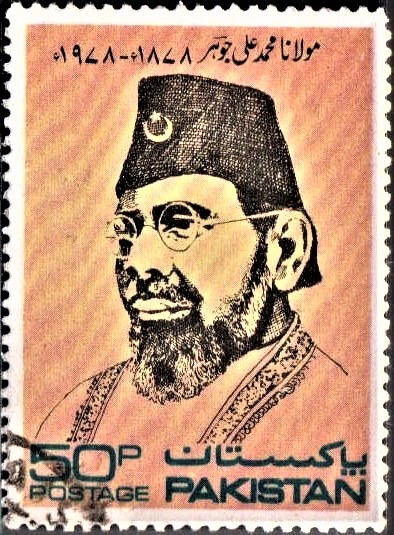
Pakistan on Maulana Mohamed Ali Jauhar 1978
A commemorative postage stamp on the Birth Centenary of Maulana Mohammad Ali Jouhar :
 Issued by Pakistan
Issued by Pakistan
Issued on Dec 10, 1978
Description : The format of the stamp is vertical. The pen and brush sketch of Maulana Mohamed Ali Jauhar is printed in black against orange background. The caption in Urdu “![]() ” is printed on the top. The word “Pakistan” in English and Urdu, the denomination “50 Paisa” and “Postage” are printed in blue colour at the bottom.
” is printed on the top. The word “Pakistan” in English and Urdu, the denomination “50 Paisa” and “Postage” are printed in blue colour at the bottom.
Designer : Adil Salahuddin
Type : Stamp, Postal Used
Denomination : 50 Paisa
Colours : Blue, Black, Red and Yellow
Size of Stamp : 44.50 x 32.50 mm.
Size of Print : 41.50 x 29.50 mm.
Perforation Gauge : 13 x 13 C
Quantity : One Million
No. of Stamps in one sheet : 50
Process of Printing : Litho Offset
Printers : Pakistan Security Printing Corporation
Name : Muhammad Ali Jauhar
Born on Dec 10, 1878 at Rampur, Rampur State, British India [now in Uttar Pradesh, India]
Died on Jan 4, 1931 at London, United Kingdom
About :
- A fiery orator, a forceful writer and fearless freedom fighter, Maulana Mohamed Ali Jauhar whose birth centenary falls on 10th December 1978 was credited with having the heart of Napoleon, the pen of Macaulay and the tongue of Burke. For nearly two decades he strode the Indian political scene like a colossus and had the unique distinction of having directed the affairs of the three most important political parties in the country – The Indian National Congress, The All India Muslim League and the Khilafat Movement. A devout muslim and a staunch patriot, he fought both for India and for Islam. He gave his life for India and found a permanent resting place in a muslim sanctuary.
- Born in Rampur on 10th December 1878, he was orphaned while still a baby. The credit for his education and up-bringing goes to his great mother, popularly known as Bi–Amman. He obtained his Bachelor’s degree from Allahabad University obtaining the first position and took an Honours Degree in Modern History from Oxford.
- After four years in England he came back to India and joined service, first in Rampur and then in Baroda. While in the service of the Gaekwad, he decided to become a journalist. He knew that in this venture he had to sacrifice all and to expect no material gain but he firmly closed his eyes to all temptations and left for Calcutta to start the “Comrade” – ‘comrade of all and partisan of none’ as he put it. The first issue came out on January 11, 1911. Born in abject poverty, the ‘Comrade‘ took the journalistic world of India by storm. Later he started the ‘Hamdard‘ from Delhi and the Muslim Outlook from England and piloted ‘Echo de I’Islam‘ in Paris.
- Mohamed Ali had participated in politics before coming to Calcutta but he now made it the focal point of his life instead of a facet of his many sided personality. Politics was now a passion, not a pastime, and journalism was means, not an end. His contributions to the various political movements in India from 1911 to 1931 are now a matter of history.
- His convictions were deep and his enthusiasm boundless. He inspired all by the fire that kindled in him. By his simplicity, sincerity and missionary zeal he reached the heart of the masses and captured them as no one had done before.
- He was only too ready to face the gallows for the sake of his country and in 1921 he narrowly escaped it when he was tried for incitement to mutiny in the famous Khaliqdina Hall at Karachi. Undeterred by all obstacles, he continued the heroic fight for freedom inspite of his growing years and failing health. It was a tough fight but he never gave in.
- Although seriously ill he attended the Third Round Table Conference in 1930. Sitting in a chair he spoke in its Plenary Session: “I want to go to my country, if I can go back with the substance of freedom in my hand, and if you do not give us freedom, you will have to give me a grave here”. The British Government did not give freedom to India, but Maulana Mohamed Ali won a grave in a free country. He died in London on January 4, 1931. The body was carried to Jerusalem and buried in the place of the Prophets. Iqbal wrote a touching poem at the death of his comrade :

- Issued by: The Director General, Pakistan Post Office, Karachi.



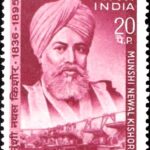
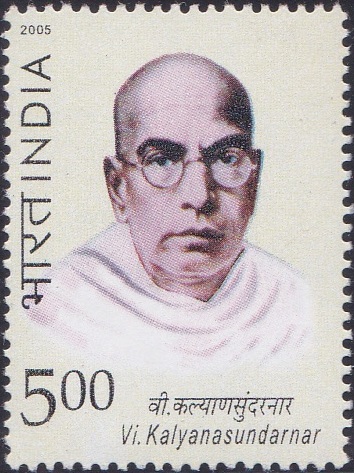
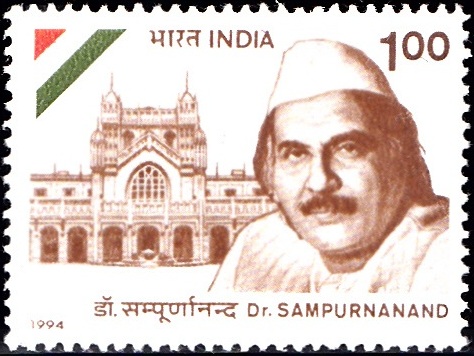
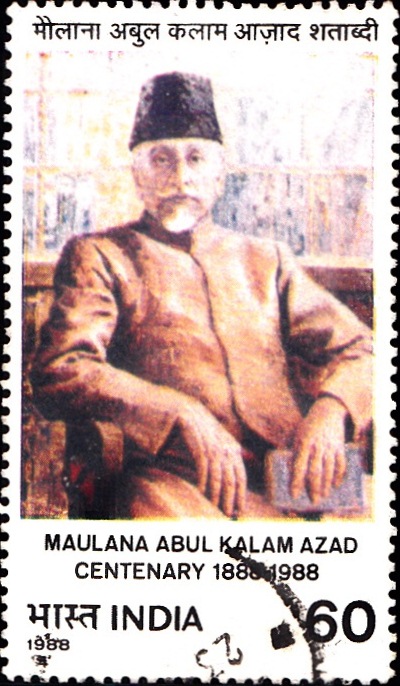
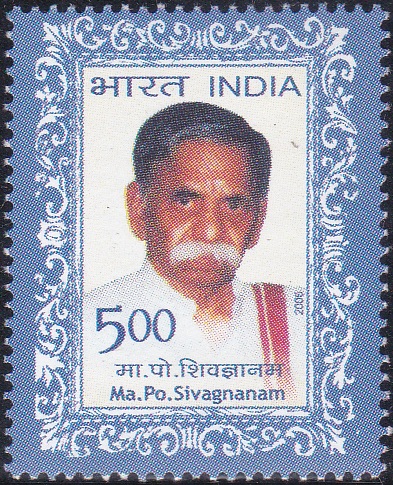
[…] the Khilafat and the Non-Cooperation Movements. Distinguished leaders like Mahatma Gandhi, Maulana Muhammad Ali, Hakim Ajmal Khan, Dr. Mukhtar Ahmad Ansari, Maulana Abul Kalam Azad and Dr. Zakir Husain were […]
[…] turning point in his life came in October 1920 when Mahatma Gandhi, accompanied by the Ali brothers, visited Aligarh to explain his doctrine of Satyagraha and the need to boycott educational […]